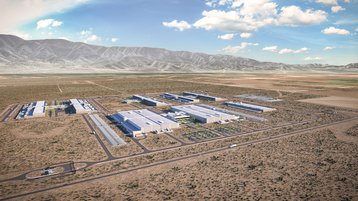In a difficult quarter where its core advertising business faces threats, and its users have more social media choices than ever, Meta said that it would continue to spend heavily on data center infrastructure.
But the company, formerly known as Facebook, pitched the move as a long-term cost saver, claiming that it would be able to buy different types of servers, and run them for longer.
In the third quarter, Meta's capital expenditure, including principal payments on finance leases, was $9.5 billion. This was primarily driven by investments in servers, data centers, and network infrastructure.
Looking forward, the company said that it was planning to reduce costs in a number of areas, including headcount and reducing its office footprint. But with data centers, it expects to increase spending.
"We are significantly expanding our AI capacity," Meta's chief strategy officer Dave Wehner said in an earnings call (via SeekingAlpha).
"These investments are driving substantially all of our capital expenditure growth in 2023. There is some increased capital intensity that comes with moving more of our infrastructure to AI. It requires more expensive servers and networking equipment, and we are building new data centers specifically equipped to support next-generation AI hardware."
Wehner said that the company will evaluate the financial return it gets from such hardware on products like Feed, Reels, and Ads, which will then inform how much it continues to invest in AI hardware.
"Second, we are making ongoing investments in our data center footprint. In recent years, we have stepped up our investment in bringing more data center capacity online," Wehner said. "And that work is ongoing in 2023."
He added: "We believe the additional data center capacity will provide us greater flexibility with the types of servers we purchase and allow us to use them for longer, which we expect to generate greater cost efficiencies over time."
In total, the company expects capital expenditures to be in the range of $34 billion to $39 billion next year, with servers and network infrastructure carrying the bulk of those costs.
The heavy spending on the future comes as Meta faces a very current crisis - declining revenues, and departing users. The company reported a four percent drop in revenue, continuing a revenue decline that began last quarter. Profits halved.
The company pointed to global economic uncertainty as the reason why advertisers were cutting back on spending.
With the growth of TikTok, BeReal, and other platforms, Meta's Facebook and Instagram are also facing fierce competition for users' time. But Meta said that it had added users this quarter, and that Facebook had more daily users than ever before.
But shares dropped dramatically following the call, cratering some 20 percent. The company had already fallen in value by around 60 percent from its all-time high, and is now at a seven-year low.
Mark Zuckerberg's efforts to reinvent the company as a metaverse business has yet to win over investors. Earlier this month, investors Altimeter Capital penned an open letter claiming that the CEO had lost his way.
Altimeter called on Meta to cut staff costs by 20 percent, reduce capex by $5 billion, and dramatically cut back on metaverse spending.
"The company has announced investments of $10–15bn per year into a metaverse project that largely includes AR / VR / immersive 3D / Horizon World and that it may take 10 years to yield results," Altimeter CEO Brad Gerstner said. "An estimated $100bn+ investment in an unknown future is super-sized and terrifying, even by Silicon Valley standards."
So far, such heavy spending appears to have little to show for it. After being criticized for Meta VR avatars being floating torsos, Zuckerberg took to the stage earlier this month to announce that "legs are coming soon," showing a video of the CEO jumping in the metaverse.
It was later revealed that the demo was staged with motion capture.




